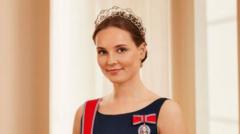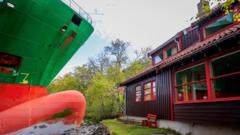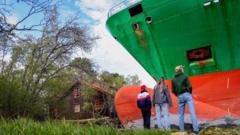The traditional russe celebrations among Norwegian school leavers have transformed into a month-long party culture linked to increased peer pressure, heavy drinking, and academic struggles. The government aims to regulate these festivities as parents voice their worries over health and inclusivity, stirring debate about the future of the celebrations.
Norwegian School Leavers' Party Tradition Faces Backlash Over Excesses

Norwegian School Leavers' Party Tradition Faces Backlash Over Excesses
As Norway's school leavers commence celebrations in party buses, concerns soar over detrimental effects on health, wellbeing, and academics.
Norwegian school leavers are embroiled in a vibrant tradition that has recently begun drawing criticism from parents, experts, and government officials. Known as russe, these celebratory festivities feature students clad in colorful overalls and culminate in a month-long series of parties, often held on rented party buses dubbed russebuss. The excitement among school leavers is palpable, as students celebrate the end of their thirteen-year educational journey and prepare for their final exams.
However, an increasing number of young people are starting their celebrations weeks earlier, leading to concerns over the impact of such prolonged partying on their wellbeing and academic performance. “A party bus! We go out every night for a month, we get drunk…it’s just fun!” exclaims 19-year-old Edvard Aanestad, reflecting the seemingly carefree attitude among students. But along with the fun, parents and officials are raising alarms about excessive drinking, potential drug use, and negative peer influences during this crucial exam period.
Prime Minister Jonas Gahr Støre voiced his concerns last year, acknowledging that while he enjoyed his own graduation, the bus culture has spiraled beyond enjoyable celebration into something more troubling. “We are worried about negative trends among Norwegian youth,” said Solveig Haukenes Aase, a concerned parent, underscoring that the festivities are affecting children younger than high school age. In response, she and other parents have formed a group dedicated to promoting safer environments for youth.
Norwegian authorities, including Education Minister Kari Nessa Nordtun, confirm that the intertwining of festive celebrations with examination deadlines has severely impacted students’ focus and academic performance. The festivities have become highly commercialized, creating a culture where social exclusion and financial burdens weigh heavily on many families.
To combat these issues, the government intends to move celebrations to post-exam periods starting next year. Although the tradition of using party buses began in the early 1980s, their current adaptations and elevated costs have led to a divided landscape among students: some can participate, while others are left out. It has been reported that some bus groups require expenses as high as 3 million krone (£220,000) for a single bus.
“Bans on certain transport options will lead to fewer buses, which exacerbates exclusion," warns Edvard, pointing out the adverse effects of the proposed changes. He and his friend Henrik, both graduates fighting for the preservation of their beloved festivities, argue that authorities are misjudging how to tackle the issues at hand.
Moreover, with the government calling for improved safety regulations—potentially banning standing room and sideways seating on arriving buses—students who have been eagerly planning their celebrations express dissatisfaction with the direction the government is taking. As they continue to navigate their final school days, the ongoing debate between celebration and safety leaves many questioning the future of this cherished yet controversial tradition.

















